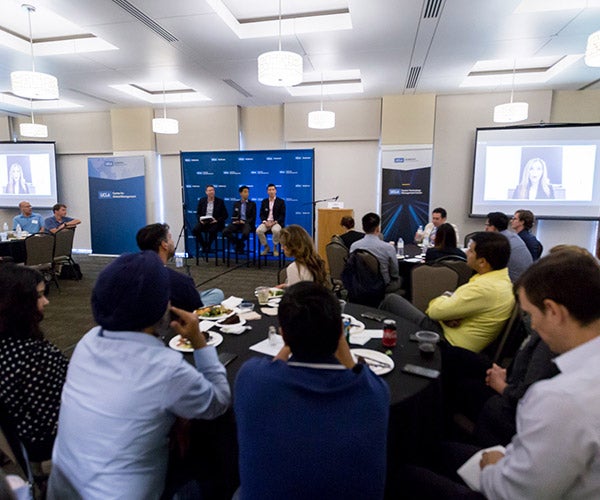Technology-Based Transformation of Shenzhen and Hong Kong
Technology-Based Transformation of Shenzhen and Hong Kong

A notable transformation is occurring in Shenzhen and Hong Kong.
This technology-driven transformation has been enabled by government policy, changes in consumer preferences and enterprise-driven innovation. The Center for Global Management’s recent technology-focused global immersion course, led by Terry Kramer, adjunct professor and faculty director for the Easton Technology Management Center, helped students to understand the dynamic growth of Shenzhen juxtaposed against the historic prosperity of Hong Kong. And in the process of understanding these two fascinating success stories, the course uncovered the “cause-and-effect” relationship of government policy and the changes in consumer preferences and technology in driving unique outcomes. Visits such as those with Tencent/WeChat, Foxconn, DJI, Mindray and Royole, as well as other emerging artificial intelligence and fintech companies, were important in telling the story. They helped illuminate the region’s political, economic and innovation-oriented environment and the significant changes that have occurred over the last several decades.
On Monday, August 19, following a networking reception in the Marion Anderson Courtyard, Professor Kramer moderated a conversation with technology-oriented Class of 2019 students and alumni who participated in the course. Morgan Greenwald, partner marketing manager at Microsoft in Bellevue, joined via Zoom web conference. He and Ryan Tan (’19), vice president of M&A and corporate planning at StarHub Ltd. in Singapore, and Richard Tran (’19), consulting services consultant at Neustar Inc., shared insights and lessons learned from visits to these leading technology companies, which demonstrated the notable transformation in the region and for China more broadly in areas such fintech, high-tech smart manufacturing, social media and internet services. The panelists shared their views on the impact of technology and unique contexts of Shenzhen and Hong Kong, discussed their own countries in relation to this transformation and outlined the opportunities and challenges presented, as well as their own leadership learnings.

Professor Kramer also shared his own observations with the packed executive dining room full of engaged and interested current students, alumni, faculty and special guests, who were also able to engage in the conversation through the Slido audience interaction tool. His observations that arose from the course included: the notable case of rising outcomes/reduction of poverty; leapfrog innovation that was evident everywhere (for example, mobile payments); Chinese companies’ expanding product/service offerings domestically (often greater than international expansion); the notable role of government in driving adoption (such as 5G) and winners/losers. The role of data is massive, and it was clear that Chinese consumers are very willing to share data and try new services. “China is advancing faster in the data driven world — then the U.S., then India and then Europe,” Kramer said.
He also shared interesting observations from the team projects that the students completed during the course. Student team project innovations almost exclusively focused on large company innovations (like those at Tencent) and these innovations focused almost exclusively on the Chinese market. There were requirements for scale and lesser focus on international opportunities in the near team. The role of government was also key, and there are clearly advanced forms of technology (like virtual assistants utilizing AI) being developed. Students identified less concern on required quantity and availability of data, and there will be future of work considerations for China (as well as for the U.S.). It was interesting that Hong Kong was neither identified as a location for development of innovation nor as a target market.
Given the overwhelming demand for the course and interest in the topic, the Center for Global Management will be running a similar course with Kramer in winter/spring 2020. The discussion was a collaboration between the Center for Global Management and Easton Technology Management Center and the UCLA-NUS Executive MBA program.